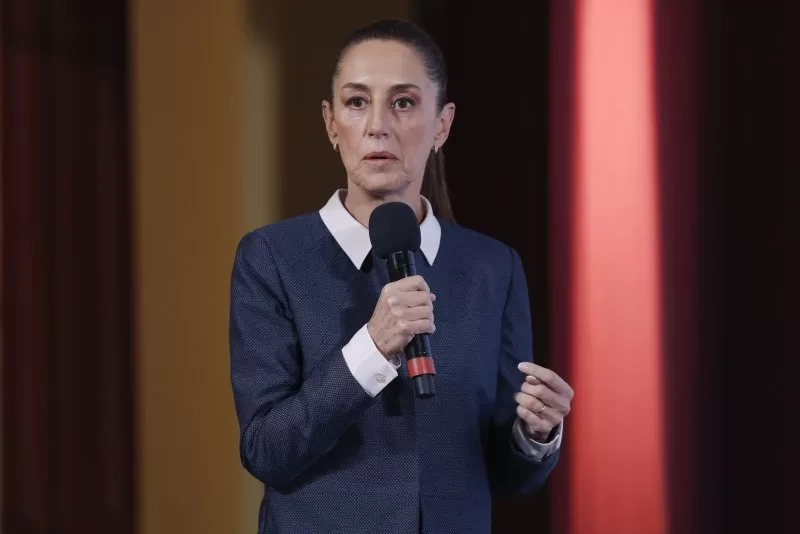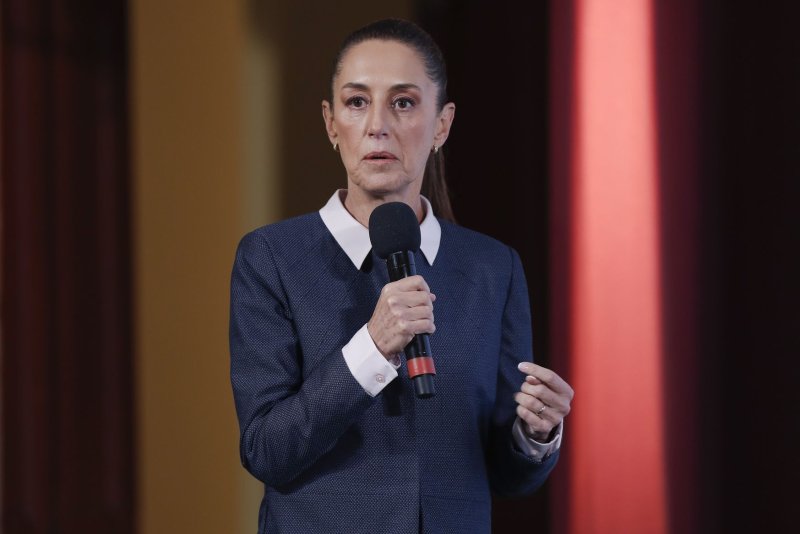1 of 3 | Mexican President Claudia Sheinbaum speaks during a press conference at the National Palace in Mexico City, Mexico, on Tuesday. Sheinbaum addressed the threats of tariffs by US President-elect Donald Trump, rejecting the proposed measures. She also mentioned plans to reach out to Canadian Prime Minister Justin Trudeau to discuss the importance of the United States-Mexico-Canada Agreement. Photo by Isaac Esquivel/EPA-EFE
Nov. 27 (UPI) — President Claudia Sheinbaum of Mexico said she had an “excellent conversation” with U.S. President-elect Donald Trump on Wednesday, lowering tensions stoked this week by the American leader’s threat to impose punitive tariffs against allies Mexico and Canada, over allegations that migrants and drugs making their way through those countries into the United States.
The United States’ North American allies were seemingly taken by surprise this week when Trump on Monday announced via his Truth Social platform that he would sign executive orders on his first day in office, Jan. 20, to impose a 25% tariff on all imports from Mexico and Canada.
He threatened that the tariffs would remain in place “until such time as Drugs, in particular Fentanyl, and all illegal Aliens stop this Invasion of our Country!”
Sheinbaum said she and Trump on Wednesday “discussed Mexico’s strategy on the migration phenomenon and I shared that caravans are not arriving at the northern border because they are being taken care of in Mexico.”
“We also discussed strengthening collaboration on security issues within the framework of our sovereignty and the campaign we are carrying out in the country to prevent the consumption of fentanyl,” she said in a statement.
In a statement of his own, Trump claimed that Sheinbaum “agreed” to halt migration through Mexico into the United States, though the Mexican president made no statement concerning an agreement had been reached or that there would be any change to Mexico’s policy.
She later issued a second statement, saying that in her conversation with Trump, she explained the “comprehensive strategy” that Mexico has been following to address migration.
“Thanks to this, migrants and caravans are assisted before they reach the border. We reiterate that Mexico’s position is not to close borders but to build bridges between governments and between peoples,” she said.
UPI has asked Sheinbaum’s office for confirmation.
In his statement, Trump described their conversation as “wonderful” and “very productive.”
Since Trump made his threat Monday, Mexico and Canada have been seeking to respond. Sheinbaum has warned that if Trump made good on his threat, Mexico would be forced to respond with tariffs of its own.
Mexican officials, during a press conference on Wednesday, outlined negative impacts that the United States would incur as a result of Trump’s tariffs, including the loss of some 400,000 American jobs. They added that the main U.S. automotive companies would also suffer, especially since 88% of pickups sold in the United States come from Mexico. The tariffs, they said, would cause an increase of roughly $3,000 per vehicle made in Mexico that is sold in the United States.
Sheinbaum added that she expects the relationship to remain as it is, given the negative economic effects Trump’s tariffs would have on Mexico, the United States and Canada.
“It benefits all three economies, and that is something the three countries, their businesspeople, and their governments know,” she said.
In Canada, Prime Minister Justin Trudeau held an urgent meeting with provincial premiers to coalesce an all-of-government response.
“I spoke with the Premiers tonight about Canada-U.S. trade and the border,” he said in a brief statement on X following the meeting. “Our focus: Canadian jobs, securing the border and building on our strong partnership with the United States.”
A statement from his office said that his government has made “significant investments” to disrupt the fentanyl supply chain from China and that the number of migrants attempting to enter the United States from Canada “is a fraction” of those coming from Mexico.
His deputy prime minister, Chrystia Freeland, told reporters during a press conference that they had a “really good, really important meeting” in which they all agreed that “we need to play for Team Canada.”
“We agreed that we need to be smart, strong and united in meeting this challenge,” she said.
After Trump announced the threat, Candace Laing, president and chief executive officer of the Canadian Chamber of Commerce, warned that Trump’s intention to impose tariffs signals that the U.S.-Canada trade relationship “is no longer about mutual benefit.”
“To him, it’s about winners and losers — with Canada on the losing end,” Laing said in a statement.
“We’re facing a significant shift in the relationship between long-standing allies. Canada’s signature approach needs to evolve: we must be prepared to take a couple of punches if we’re going to stake out our position. It’s time to trade ‘sorry’ for ‘sorry, not sorry.'”
Trump has also threatened to impose 10% tariffs on top of any additional tariffs on China over the influx of drugs, specifically fentanyl precursor chemicals, making their way from the Asian nation into the United States.
China’s embassy in Washington, D.C., previously told UPI in a statement that Trump’s characterization of Beijing allowing fentanyl precursors flow into the United States is “completely counter to the facts and reality.
The embassy said the current trade relationship between the two countries is “mutually beneficial in nature.”
“No one will win a trade war or a tariff war,” it said.

